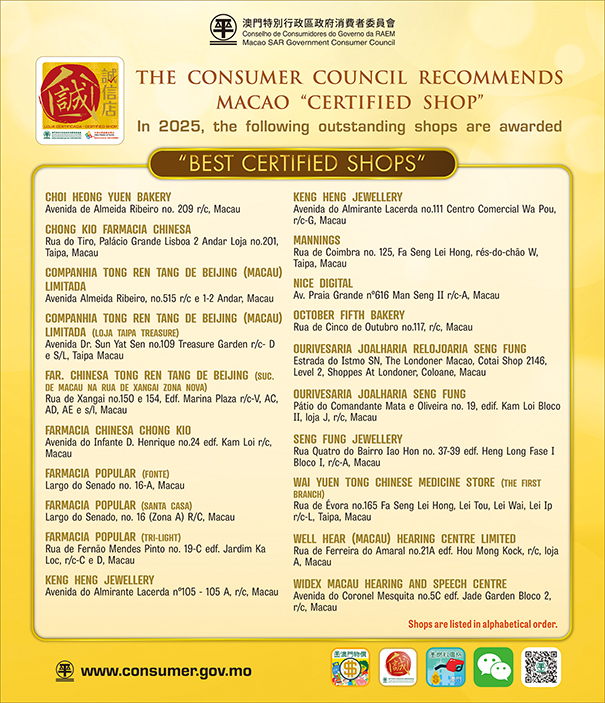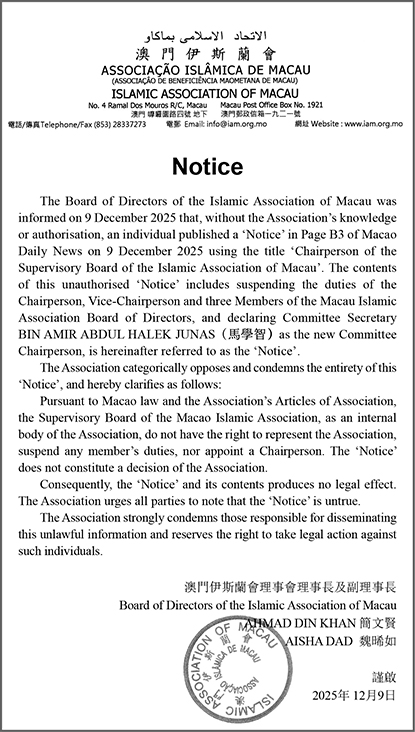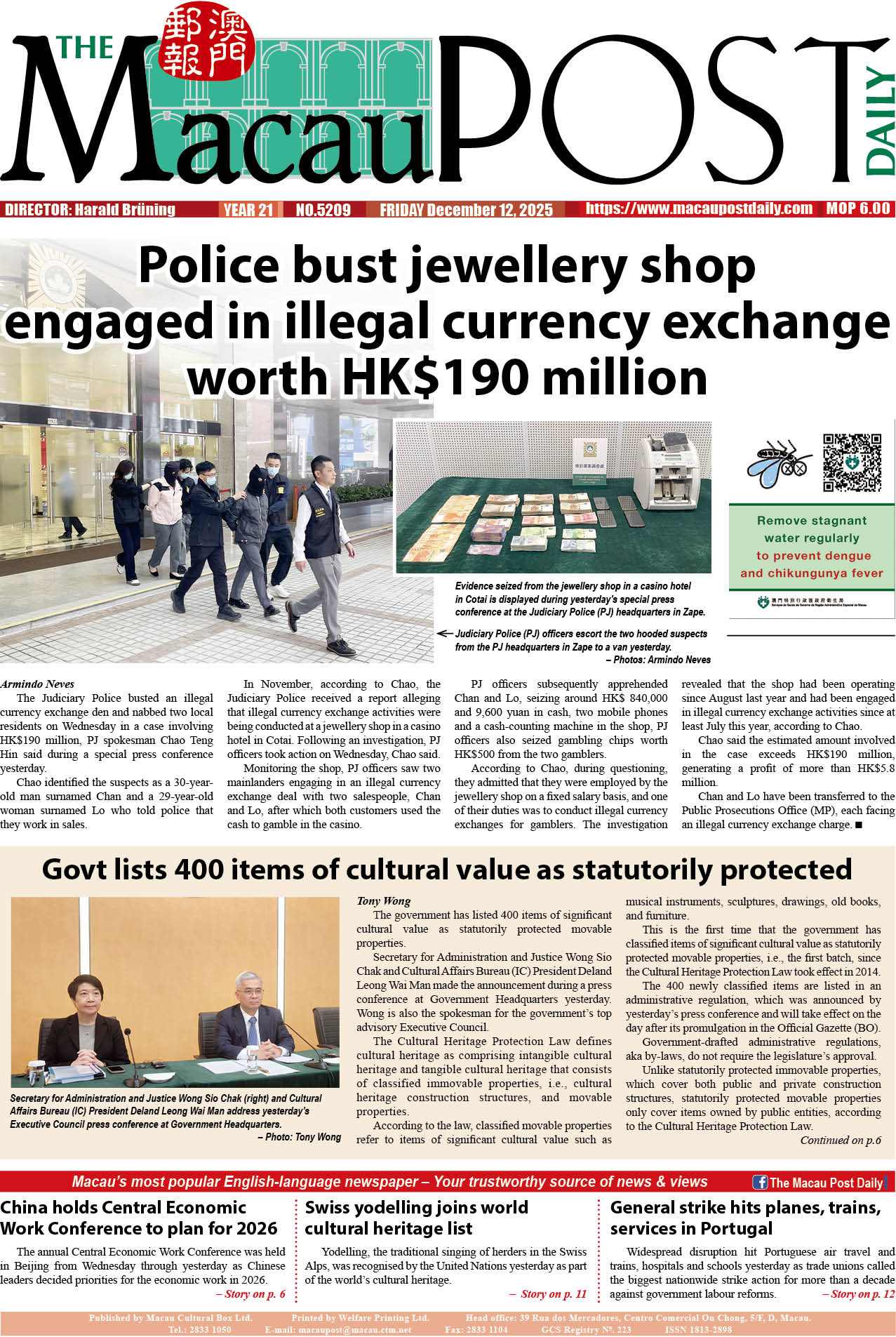The government says it expects that its new system of charging for the disposal of construction waste in the city’s only construction waste landfill, which will start on Sunday, will be able to reduce the amount of waste from the construction sector by 20 to 30 percent.
Wenmix Chan Kwok Ho, who heads the Environmental Infrastructures Management Centre of the Environmental Protection Bureau (DSPA), made the remarks while speaking to reporters on Wednesday during a media trip to the construction waste landfill in east Cotai where DSPA officials briefed reporters on how the upcoming construction waste charging scheme will be run.
Under the city’s first-ever system of charging for the disposal of construction waste, which will take effect on Sunday, the disposal of “inert” construction waste – such as soil, gravel or concrete blocks – in the landfill will cost 70 patacas per tonne, while those dumping “special” construction waste – such as sediment or mud – will be charged 200 patacas per tonne.
In July last year, the government announced a by-law regulating the city’s dumping and processing of construction waste, officially known as Construction Material Waste Management System, according to which those dumping construction waste in the landfill will have to pay. Government-drafted by-laws, officially known as administrative regulations, do not require the legislature’s approval.
Currently, the disposal of construction waste in the landfill, located in Avenida do Aeroporto, is free of charge.
Landfill since 2006
The current landfill for construction waste has been in operation since 2006. The government had admitted that the dump at the east end of Cotai has been overloaded for a few years, and officials have warned that the landfill is facing the risk of collapsing. The government launched a project in 2019 to expand the capacity of the landfill – which is located near the airport and the Light Rail Transit (LRT) depot.
According to the new administrative regulation, permits issued by the Environmental Protection Bureau will be required for vehicles dumping construction waste in the landfill.
According to a chief executive order published in the Official Gazette (BO) in August last year, the government had set the dumping fees for “inert” construction waste and “special” construction waste at 70 patacas per tonne and 200 patacas per tonne respectively.
According to the new Construction Material Waste Management System, “inert” construction waste refers to the one which has been sorted and can be used as filling material, such as soil, gravel and concrete blocks.
‘Inert, special, other’ construction waste
According to the new by-law regulating the city’s dumping and processing of construction waste, “special” construction waste refers to excavation materials such as sediment and mud, and other materials such as asphalt, fibreglass and thermal insulation cotton.
In addition to “inert” and “special” construction waste, the new administrative regulation also covers “other” construction waste, which refers to flammable residues, chemical residues and recyclable materials.
While “inert” and “special” construction waste will have to be dumped in the construction waste landfill, flammable residues will have to taken to the city’s incinerator in Pac On for processing and chemical residues will have to be taken to the adjacent Special and Hazardous Waste Treatment Plant for processing. Recyclable materials will have to taken to recycling operators for processing, according to the new by-law.
The government sets the dumping fees for “other” construction waste also at 200 patacas per tonne.
Over 90 pct of dump trucks have applied for permits
During Wednesday’s media trip, Chan said that his bureau has received 1,332 applications for the officially required permits for vehicles dumping construction waste in the landfill, 1,324 of which have been approved by his bureau. Chan said that 1,150 permits have been collected, adding that his bureau has reminded the vehicle owners via SMS who have still not collected the permits to pick them up, otherwise the dump trucks will not be allowed to enter the landfill after the construction waste charging scheme takes effect.
Chan said that the 1,332 applications account for over 90 percent of the number of vehicles which normally dump construction waste in the landfill, urging those who have still not applied for the permits to submit their applications as soon as possible. The permit is an electronic smartcard.
Singapore example
Chan pointed out that the current construction waste landfill was already overloaded several years ago, adding that therefore his bureau currently can only allow the dumping of newly-generated construction waste on top of the existing waste in the landfill.
Chan noted that the government has launched a project to consolidate the sludge at the bottom of the existing waste so as to reduce the height of the landfill, with the aim of expanding its capacity.
Chan said that after assessing the situation, the bureau has concluded that there is no suitable site in Macau for another construction waste landfill.
Chan said that therefore his bureau has hired a consultancy to study the feasibility of setting up an “ecological” island to be reclaimed using construction waste somewhere in Macau’s coastal waters which cover 85 square kilometres, in reference to the example of Singapore’s Semakau Island. He said that such an island could also become an ecological sightseeing spot.

A worker stands near a lorry dumping construction waste in the construction waste landfill in Cotai during Wednesday’s media trip.
Courtesy: TDM










